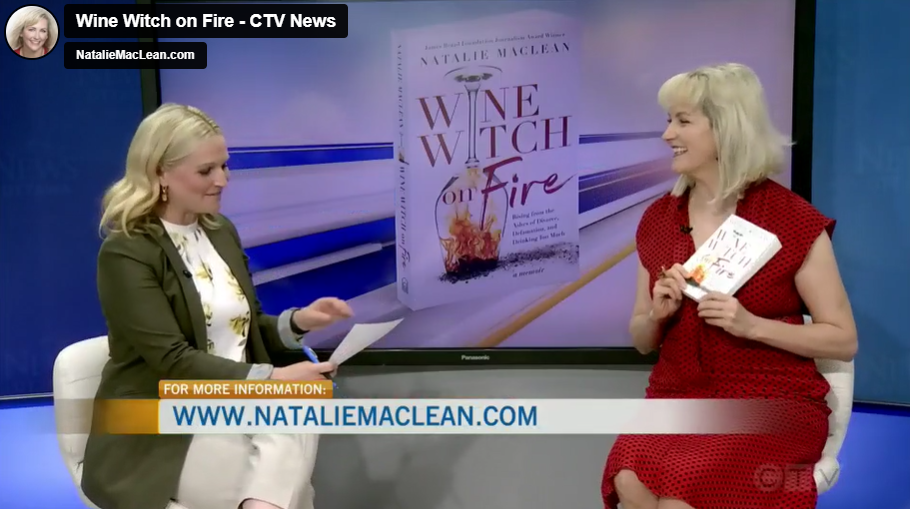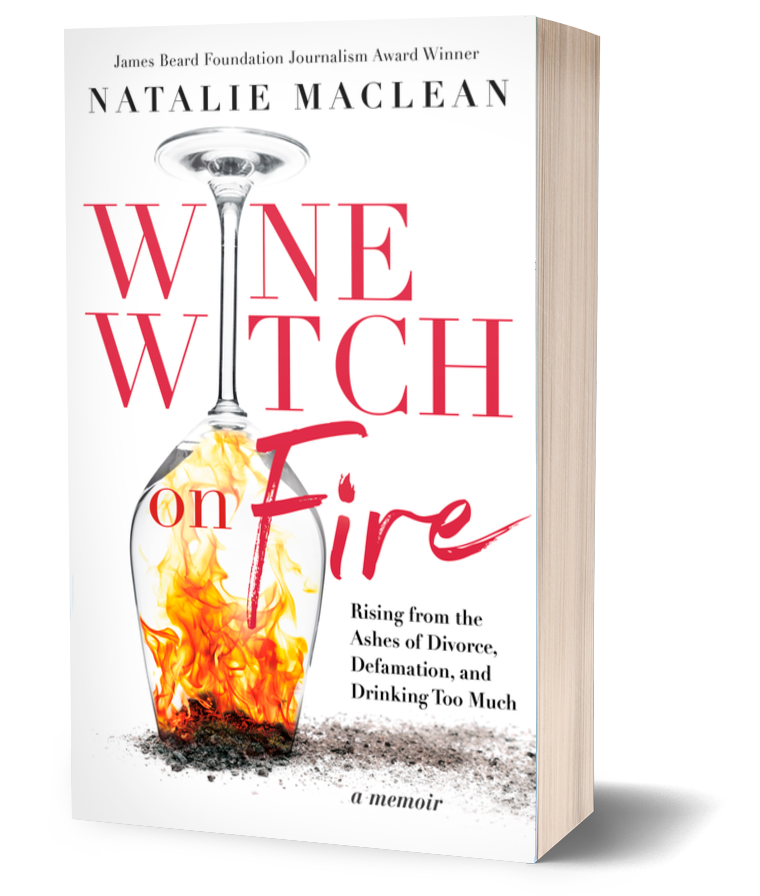
Annette and I chat about the memoir on CTV’s Morning Show.
In her new memoir, Wine Witch on Fire: Rising from the Ashes of Divorce, Defamation, and Drinking Too Much, Natalie MacLean writes about resurrecting her life and career in the glamourous but sexist wine industry. Indigo has named it one of the “Most Anticipated Books of the Season.” Natalie joins us now to chat about her memoir.
Welcome Natalie.
So what is the book about?
Wine Witch on Fire: Rising from the Ashes of Divorce, Defamation, and Drinking Too Much starts with my shock when my husband of twenty years, a high-powered CEO, demands a divorce. My year gets even worse when an online mob of rivals comes for my job. You could say it was a bad vintage.
Wavering between despair and determination, I have to fight for my son, rebuild my reputation, and salvage my self-worth using my superpowers: heart, humour, and an uncanny ability to pair wine and food.
I question my insider role in the slick marketing that encourages women to drink too much while I battle the wine world’s veiled misogyny. In the end, I need to reconnect with the vineyards that once brought me joy, the friends who sustain me, and my own belief in second chances.
This true coming-of-middle-age story is about transforming your life and finding love along the way.
How did you come up with the title (or why the witch theme)?
You might think that from the title this is about an angry woman who drinks a lot of wine and owns a lot of cats. But it’s not.
Witches resonate with me because their strength comes from within, not from external validation. They also embody the unity of women, the power of the feminine, and the healing connection to nature. My favourite childhood stories were always about witches, both good and bad, especially The Wizard of Oz and battling duo of Glinda the Good Witch and the Wicked Witch of the West who was unnamed in the book. I was entranced with these opposing forces that I later realized was inside me.
I even loved the straight-up badass White Witch of Narnia. Her wickedness was such a satisfying outlet for a tiny Miss Goodie Two Shoes. I cackled inside along with her. Now, of course, I realize how damaging stereotypes of women can be, and I think it’s time to reclaim the word witch and what it means: a wise woman who’s been through the fire and knows the measure of her powers.
Why write this book?
At first, I thought, just walk away this dumpster fire and forget it. It was too painful to even look at my journal notes during that year. To write about it publicly would vandalizing my own privacy. So that’s what I did for five years. But the story ricocheted around my head all that time, and I finally realized I had to let it out, at least on paper.
For the first year I spent writing this story, I had no intention of publishing it. It was a private exercise in making sense of what happened to me.
I realized, though, that keeping this story to myself was a way of not connecting fully with others. Many memoirists say they publish their stories so that others feel less alone. I believe them, but what does that mean? How do my words comfort someone when our situations can be so different?
As parents, we help our children to find the words they need to articulate their feelings. We ask them if they’re hungry, tired, sad, etc. Naming the emotion and talking about it gives them another way to deal with feelings beyond crying and tantrums.
As adults, many of us lose touch with our emotions or we haven’t developed the vocabulary for more complex feelings. Dr. Brené Brown says we can usually name just three — happy, sad, and ticked off — but there are actually more than 87 that she explores in her book Atlas of the Heart.
Even though the specifics of their lives are different—they may not have gone through a divorce, but they’ve probably felt loneliness and the longing for love. They may not have been attacked by an online mob, but they may have felt career disappointment, or fear of the future. My memoir helps them experience those feelings though a different story and learn how someone emerged from those fires stronger and wiser.
Why write this book now?
I needed the distance of years to be able to reflect on what happened so that the book is actually useful to others and not just a misery dump. Memoirist Glennon Doyle advised, “Write from a scar, not an open wound.” But why even write about it after the healing is done? Poet Sean Thomas Dougherty had the answer. “Why bother? Because right now, there is someone out there with a wound in the exact shape of your words.”
My memoir gathered different parts of my life that I thought were separate but were just two sides of an open wound. Words were my sutures to sew my life back together. The scars they created are now patterns of meaning that are stronger than the flesh before the injury. Those new patterns and reflections are what readers are resonating with now.
This book is in part about how you learned how to deal with your own alcohol consumption after dealing with some tough times. Tell us about that and what you learned?
Situational, underlying issues
What tips would you share with others when it comes to moderating their own alcohol consumption?
· Pour half of a full bottle of wine into an empty half bottle to save it for another night. This made me more conscious of how much I was consuming and allowed me to fret less about wasting good wine. The half bottle reduced oxygen exposure, so it tasted fresh when I opened it.
· Try gadgets like Repour corks and Preserve spray that can keep wine fresher longer.
· Drink one glass of water for every glass of wine, alternating sips between them. This helps slow your pace of alcohol consumption and keeps you hydrated.
· Make low and no-alcohol wines part of your repertoire. This category of wine is exploding in growth and there are lots of tasty choices.
· Deal with underlying issues. Moderation became much easier after I dealt with the depression about my divorce and the anxiety from the online attacks with a professional therapist.
Although this isn’t a self-help book, you do share tips on how you moderated your own alcohol consumption. Share a few of those with us please.
When I open a bottle, I’ll pour half the wine into a clean, empty half bottle and recork it. It keeps the wine fresh for another night, and I’m more mindful about how much I’ve consumed.
I drink a glass of water for every glass of wine to stay hydrated and to slow my alcohol consumption.
I ask myself what was the thought before the thought, “I need a glass of wine.” If it’s about relieving stress and not enjoyment, then I try to find another way to do that: go for a walk, take a bath, watch a favourite show.
What do you expect readers to take away from this book?
A piece of themselves — better understood.
The winemaking term “dry extract” refers to the essence of the wine’s flavour components when all the moisture has evaporated. Dry extract is in us too, as people, our deepest reserves of strength and resilience. It’s what’s left after life has burned us down to our essence. I want readers to hold on to that, to know that they can rise again after they walk through those flames, stronger, brighter, fiercer.
Where can we get the book?
All bookstores have it as of today, both online and those old-fashioned bricks and mortar stores. I’ve listed them all at www.WineWitchonFire.com/stores.
You also have a wine guide for book clubs, wine groups and individual readers of your memoir. What’s in it and where can we get it?
The free guide has questions that not only relate to the book, but also to broader issues about drinking, sexism in marketing, and dealing with trauma. It also recommends wine to pair with the book and other books. You can use the guide in a group or just read it on your own.
You can get the free guide here: www.winewitchonfire.com/guide
I’m also offering everyone who buys the book personally signed bookplates. I’ll mail these to you for the copies you buy for yourself and for friends and family as gifts as it makes them more personalized.
Thank you, Natalie!
Posted with permission of CTV.








